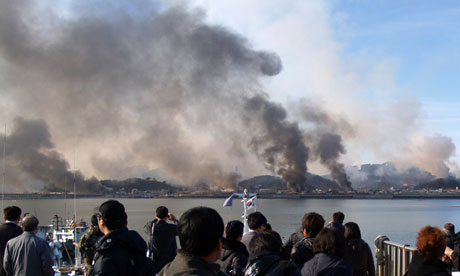November 24, 2010, 10:11 am North Korean Radio Explains Clash
By ROBERT MACKEY On Wednesday, North Korea’s international shortwave radio service, Voice of Korea, broadcasting in English to the outside world, put its spin on Tuesday’s exchange of fire between the two Koreas across their contested sea border.
As Steve Herman, a correspondent for Voice of America in Seoul, points out on Twitter, a subtitled recording of the North Korean broadcast was posted online by Martyn Williams, a technology journalist based in Tokyo.
As Mr. Williams explains in a post about the recording on his blog, North Korea Tech, “the radio report comes 24 hours after a similar report was carried in English on the Korea Central News Agency wire. The lateness of the report highlights the Voice of Korea’s rigid daily programming, which changes only once per day. The report is very similar to the KCNA bulletin, although there are differences. It’s either been rewritten for radio delivery or been translated from the original Korean by a different person.”
The radio broadcast does indeed make more liberal use of the term “puppets” to describe South Korean military forces than the English-language report posted online by North Korea’s official news agency, KCNA.
That said, both reports are striking for the belligerent tone captured in the warning KCNA renders this way:
Should the South Korean puppet group dare intrude into the territorial waters of [North Korea] even 0.001 mm, the revolutionary armed forces of [North Korea] will unhesitatingly continue taking merciless military counter-actions against it.
That jingoistic declaration seems to reinforce an analysis of the clash mentioned on Tuesday in a previous Lede post on the shelling across the disputed maritime border. In an interview with the BBC, Brian Myers, an American expert on North Korea, suggested:
We need to keep in mind that North Korea is a self-described ‘military-first’ state — in other words, a state which justifies its existence not on the basis of any kind of economic promises or economic claims but on the basis of the claim to be the stronger of the two Koreas, the Korea that is standing up for itself. And when you have that kind of raison d’etre, then you need military victories on a periodic basis — or, at least, provocations of the outside world.





 Reply With Quote
Reply With Quote




 Tuesday, November 23, 2010 - 3:25 PM
Tuesday, November 23, 2010 - 3:25 PM 




Bookmarks